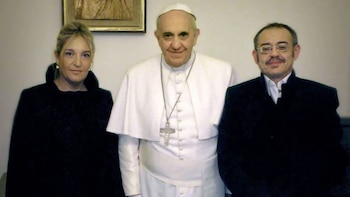
An investigation carried out by reporter Antony Barnett for Channel 4's UK Dispatches (a public TV channel) revealed the horrors of child labour behind the production chain of one of Britain's most beloved Easter treats.
The journalist traveled to Ghana, West Africa, where children up to 10 years old carry out grueling work on cocoa farms under the hugging heat and on days of up to nine hours a day.
These farms would be part of the production chain of Cadbury, one of the most beloved British brands, which sells some 200 million classic creamy eggs each easter season, and which in all its units comes with the Cocoa Life seal, which guarantees consumers that the ingredients are obtained from a ethical way.
But according to Barnett's research, children in Ghana wield one-meter machetes to cut hard weeds, without protective clothing, or break the pods with long, sharp knives, and many suffer serious injuries due to hazardous work.
In addition, the journalist discovered that farmers were paid less than 2 pounds sterling ($2.6) a day for the cocoa they sell to Mondelez, the US company that owns Cadbury.

“Farmers are paid so little that they can't afford to hire adults to work on the farm, so they have to use their children,” Barnett told The Sun.
“So they're taken out of school to work on the farm. But there were also cases where they were not children in the family, but had been brought from elsewhere to work on the farm,” he adds.
Mondelez, Cadbury's parent company, says they “strongly refute” allegations that they benefit from child labour.
Cocoa Life, which aimed to raise the standard of living of cocoa farmers and their families and to eradicate child labour, was created by Cadbury in 2012.
“We believe that children's work is education and play. No amount of child labour in the cocoa supply chain should be acceptable,” they say on their website.
But a decade later, an estimated 1.56 million children are involved in cocoa production in Ghana and the Ivory Coast, with 95% of them involved in hazardous child labour, according to the latest report by the National Opinion Research Center.
The report found that, despite promises from chocolate companies, including Cadbury, the proportion of children between the ages of five and 17 involved in cocoa work has actually increased in Ghana, from 44% to 55%, since 2009.
Under Ghanaian law, it is illegal for children under the age of 13 to work and no one under the age of 18 should engage in hazardous work.
But on the first farm Barnett visited, he found brothers aged 10 and 11 beating cocoa pods from trees with long sticks.
He later saw the children make their way through the dense undergrowth with deadly machetes, as sweat gushed from their bodies under the scorching sun.

One of the minors revealed that his father kept him out of school to harvest the cocoa and showed Barnett a scar on his leg because he was cut with the machete.
He also struggled to lift the huge baskets full of pods that children were expected to carry for miles across farmland, and his father admitted that they often suffer neck pain from heavy loads.
On another farm, a 12-year-old boy had been sent to work on the other side of the country, living with the farmer's family, because his father couldn't pay to send him to school.
He worked many hours opening sheaths with a sharp steel knife, more than 30 centimeters long, and was paid the equivalent of $46 for several months, which he sent directly to his parents.
A girl about 14 years old also revealed that her aunt had trafficked her from the north of the country five years ago and told her that she would take care of younger children and learn to be a seamstress.
Instead, they forced her to work hard all day in the scorching sun, doing hard labor and denied her the opportunity to go to school.
“My uncle says he has difficulty feeding his own children, so if I join them he won't be able to buy the school books,” she said.
Barnett told The Sun that he was surprised to find such young children in obvious danger.
“I expected to see them pulling out pods or spraying pesticides, so what surprised me the most was how involved they were in this really dangerous job. It was the use of the machete and these sharp knives that really worried,” he said.
The journalist stressed that the children were so young that the machete was more than half its height, so maneuvering was very difficult and tiring, and it caused injuries to be made with the tool.
The fixed minimum price for cocoa is only 660 Ghanaian cedis (about $104) per bag and Mondelez pays an additional 'premium' to Cocoa Life farmers of 10 cedis, which is around $1.31.
One bag contains enough cocoa to make 4000 bars of the famous Dairy Milk and the average farmer produces eight a year.
For every pound sterling ($1.31) spent on chocolate in the UK, 29 cents goes to the retailer, 38 cents to manufacturing and distribution, 12 cents to taxes and 10 cents to the manufacturer's profit. That leaves only 11 cents for farmers to cover growing costs and local taxes.

Mondelez President Dirk Van de Put refused to speak to Barnett for the show, but Cadbury's owner issued a statement saying, “We are deeply concerned about the incidents documented in Dispatches.”
“We explicitly prohibit child labour in our operations and have made significant efforts through our Cocoa Life program to improve the protection of children in communities where we source cocoa — a stand against it,” they said.
“The welfare of the children and families presented is our primary concern and we are committed to further research,” the company reiterated.
The answer was not enough, say activists such as Ayn Riggs, founder of Slave Free Chocolate, who described the evidence obtained by the Dispatches program as “horrifying”.
“The part that really infuriates me is that these chocolate companies promised to clean this up more than 20 years ago. They admitted that they knew they were benefiting from child labour, and they have shirked their promises not only for these children, but for everyone in the world,” the activist said.
Cocoa Life, whose slogan is “Cocoa done right”, claims to have invested $393 million over the past ten years to “empower at least 200,000 cocoa farmers and reach one million members of the community.”
But Barnett says the investment had little impact on impoverished farmers. “On the website and in its promotional literature, Cadbury claims to be making a difference. But I can only judge by the people we talk to, not just the children, but all the cocoa producers,” says the reporter.
“They criticized the amount of investment Cocoa Life was making and criticized the money they were getting for their cocoa beans. Nobody has anything good to say about Cocoa Life,” he reiterates, calling for a boycott against the company.
KEEP READING
Últimas Noticias
Debanhi Escobar: they secured the motel where she was found lifeless in a cistern
Members of the Specialized Prosecutor's Office in Nuevo León secured the Nueva Castilla Motel as part of the investigations into the case

The oldest person in the world died at the age of 119
Kane Tanaka lived in Japan. She was born six months earlier than George Orwell, the same year that the Wright brothers first flew, and Marie Curie became the first woman to win a Nobel Prize

Macabre find in CDMX: they left a body bagged and tied in a taxi
The body was left in the back seats of the car. It was covered with black bags and tied with industrial tape
The eagles of America will face Manchester City in a duel of legends. Here are the details
The top Mexican football champion will play a match with Pep Guardiola's squad in the Lone Star Cup

Why is it good to bring dogs out to know the world when they are puppies
A so-called protection against the spread of diseases threatens the integral development of dogs




